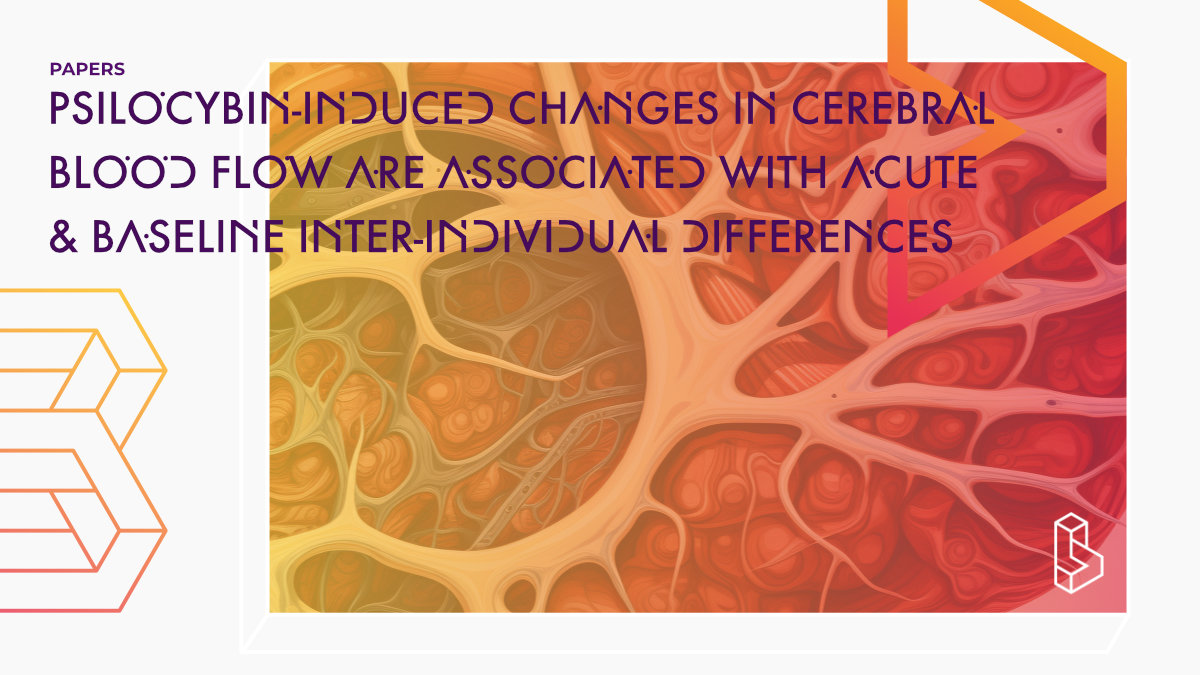This study (n=70) aimed to explore the effects of three oral doses of psilocybin (11-15mg) versus placebo on cerebral blood flow (CBF). Changes in blood flow in the brain caused by psilocybin were different for each person and depended on their initial brain conditions and how they felt during the psychedelic experience. This suggests that people have varying responses in their brains to psilocybin.
Abstract of Psilocybin-induced changes in cerebral blood flow are associated with acute and baseline inter-individual differences
“Research into the use of psilocybin for the treatment of psychiatric disorders is a growing field. Nevertheless, robust brain–behavior relationships linking psilocybin-induced brain changes to subjective drug-induced effects have not been established. Furthermore, it is unclear if the acute neural effects are dependent on individual heterogeneity in baseline characteristics. To address this, we assessed the effects of three oral doses of psilocybin vs. placebo on cerebral blood flow (CBF) using arterial spin labeling in healthy participants (N = 70; n = 31, 0.16 mg/kg; n = 10, 0.2 mg/kg; n = 29, 0.215 mg/kg). First, we quantified psilocybin-induced changes in relative and absolute CBF. Second, in an exploratory analysis, we assessed whether individual baseline characteristics and subjective psychedelic experience are associated with changes in CBF. Psychological and neurobiological baseline characteristics correlated with the psilocybin-induced reduction in relative CBF and the psilocybin-induced subjective experience. Furthermore, the psilocybin-induced subjective experience was associated with acute changes in relative and absolute CBF. The results demonstrated that inter-individual heterogeneity in the neural response to psilocybin is associated with baseline characteristics and shed light on the mechanisms underlying the psychedelic-induced altered state. Overall, these findings help guide the search for biomarkers, paving the way for a personalized medicine approach within the framework of psychedelic-assisted therapy.”
Authors: Nathalie M. Rieser, Ladina P. Gubser, Flora Moujaes, Patricia Duerler, Candace R. Lewis, Lars Michels, Franz X. Vollenweider & Katrin H. Preller
Summary of Psilocybin-induced changes in cerebral blood flow are associated with acute and baseline inter-individual differences
Psilocybin, a classic psychedelic substance, induces an altered state of consciousness, including visual alterations, audio-visual synesthesia, experience of unity, or insightfulness. Recent rsfMRI studies point to altered information processing due to increased global brain functional connectivity in sensory areas and simultaneously decreased functional connectivity in associative regions. Positron emission tomography has shown that psilocybin increases glucose metabolism mainly in frontal regions, and that arterial spin labelling studies showing increased rCBF in frontal and temporal regions and decreased rCBF in parietal regions and the insula20.
Despite our emerging understanding of psilocybin’s effects on the human brain, it remains unknown whether these neurobiological alterations are dependent on individual baseline neurobiological and psychological characteristics.
The authors leveraged the largest neuroimaging dataset to date collected under the acute influence of psilocybin, which includes 70 healthy participants assessed with ASL, to explore whether changes in cerebral blood flow are associated with individual baseline characteristics, and the altered state of consciousness induced by psilocybin.
Find this paper
https://doi.org/10.1038/s41598-023-44153-z
Open Access | Google Scholar | Backup | 🕊
Cite this paper (APA)
Rieser, N.M., Gubser, L.P., Moujaes, F. et al. Psilocybin-induced changes in cerebral blood flow are associated with acute and baseline inter-individual differences. Sci Rep 13, 17475 (2023).
Study details
Compounds studied
Psilocybin
Topics studied
Neuroscience
Study characteristics
Original Re-analysis
Placebo-Controlled
Double-Blind
Within-Subject
Participants
70
Humans
Institutes
Institutes associated with this publication
University of ZurichWithin the Department of Psychiatry, Psychotherapy and Psychosomatics at the University of Zurich, Dr Mialn Scheidegger is leading team conducting psychedelic research and therapy development.
Linked Research Papers
Notable research papers that build on or are influenced by this paper
Positron emission tomography and fluorodeoxyglucose studies of metabolic hyperfrontality and psychopathology in the psilocybin model of psychosisThis early (1997) study looked at the effects of psylocybin/psilocin in the brain through a PET scan and found increases in metabolis (CMRglu) that correlated with the experienced 'psychotic' (psychedelic) effects.
Two dose investigation of the 5-HT-agonist psilocybin on relative and global cerebral blood flow
This double-blind, placebo-controlled study (n=58) investigated the effect of two doses of psilocybin (11mg-15mg/70kg) on cerebral blood flow. The larger dose led to significantly higher ratings on 4 of 11 scales of altered consciousness. It also showed which specific brain regions became more, and less, active.
Effects of serotonin 2A/1A receptor stimulation on social exclusion processing
This double-blind, randomized, counterbalanced, cross-over study (n=19) examined the effects of psilocybin (15.05mg/70kg) on the neural response to social exclusion via multimodal brain imaging. Psilocybin reduced activity in key brain regions involved in social exclusion processing, specifically the anterior midcingulate cortex (aMCC) and the middle frontal gyrus (MFG), related to decreases in the experience of social pain and reduced affective distress following social rejection. Reduced response to social exclusion also related to psilocybin changes in the experience of self.
Psilocybin-induced decrease in amygdala reactivity correlates with enhanced positive mood in healthy volunteers
This double-blind, placebo-controlled, fMRI study (n=25) found that a moderate dose of psilocybin (11.2mg/70kg) lowered amygdala (which is hyperactive in those with major depression) reactivity to negative and neutral (visual) stimuli. The decrease in emotional processing was correlated with an increase in positive mood.

